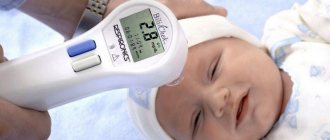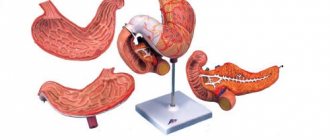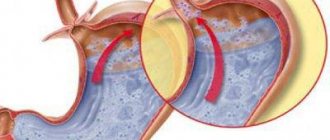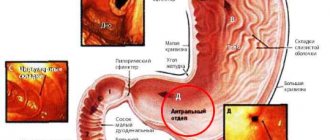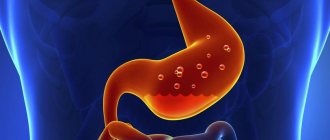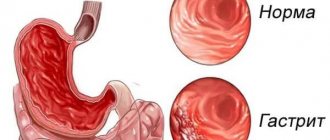Causes and features of pathology
To find out whether there can be a cough due to pathologies of the stomach, one should consider the mechanism of its appearance. Cough attacks accompanied by an unpleasant taste in the mouth cannot be considered an independent disease. Reflex contraction of the bronchi, trachea and other parts of the respiratory tract occurs in response to irritation of the mucous membranes.
Cough in diseases of the stomach appears as a result of the action of gastric juice on cough receptors in the respiratory tract. It contains hydrochloric acid, which causes a burn to the respiratory mucosa. Because of this, the sensitivity of sensory receptors increases, when irritated, the cough center is activated.
Stomach cough occurs against the background of a number of diseases, due to which the contents of the stomach flow through the esophagus into the throat:
- Gastritis is inflammation of the gastric mucosa. Most often it happens due to the spread of infection, drug abuse, poor nutrition, etc.
- Gastroesophageal reflux disease (GERD) is a pathology accompanied by the reflux of gastric contents into the esophagus and respiratory tract. Occurs due to decreased tone of the lower esophageal sphincter. Because of this, the mucous membrane of the ENT organs swells and coughing attacks appear.
- Esophagitis is an inflammation of the esophageal mucosa that occurs as a result of a chemical burn, infectious damage to the mucosa, or radiation therapy. After eating, regurgitation (backward movement) of stomach contents towards the mouth is often observed. With esophagitis, patients complain of heartburn, belching, cough, and an unpleasant taste in the mouth.
- Tumors. Benign and malignant tumors in the gastric mucosa prevent the normal movement of its contents into the duodenum. When the lower sphincter is blocked by neoplasms, the food lump penetrates the respiratory system, provoking a cough reaction.
- Heartburn is an uncomfortable burning sensation in the chest area caused by increased acidity of gastric secretions. Occurring against the background of esophagitis, stomach ulcers or gastroesophageal disease, the cough is spastic in nature. From heartburn and the penetration of gastric juice into the respiratory tract, a sour taste appears in the mouth.
Sometimes a cough is provoked by food poisoning, helminthic infestations, alcoholism, poor diet, etc. All these factors negatively affect the functioning of the gastrointestinal tract, which subsequently causes coughing attacks.
Traditional methods
Home treatment methods are used during therapy to relieve inflammation and overcome severe pain syndromes. When a cough leads to gastrointestinal diseases, it is important to normalize acidity. Recommended recipes include:
- Olive oil and lemon. Take 250 milliliters of oil, honey and lemon juice. Mix the ingredients. The mixture is consumed. The dosage is one teaspoon. The product is stored in a cool place. Applicable for low acidity.
- Milk. Milk has the property of enveloping the stomach, protecting the mucous membranes from various lesions. Drink twice a day before meals. To increase efficiency, you can add mumiyo. One glass of liquid contains 0.5 grams of mumiyo.
- Herbal decoction. For people with stomach cough, it is useful to use teas with the addition of chamomile, licorice root, sage, mint and plantain. The components must be mixed in equal quantities. One tablespoon of tea is poured with boiling water and allowed to brew for about two hours.
Characteristic symptoms of stomach cough
If the cough is caused by impaired motility of the esophagus, it is not accompanied by typical cold symptoms - runny nose, headache, wheezing in the lungs, etc. Manifestations of the disease worsen when you eat, bend or lie down, and also after physical activity.
Cough from the stomach in adults is accompanied by:
- heartburn;
- sour belching;
- hoarseness of voice;
- white coating on the tongue;
- unpleasant taste in the mouth;
- severe sore throat;
- burning in the lower chest.
With GERD and tumor diseases of the stomach, the severity of cough attacks and accompanying symptoms does not change when taking medications or food. Patients are concerned about abdominal cramps, dyspeptic disorders, and vomiting. A child's cough is often spastic in nature and is not accompanied by sputum production. With an increase in intragastric pressure, belching, seething in the intestines, and acute pain appear.
In case of intoxication of the body due to food poisoning or parasitic infections, complaints of paroxysmal unproductive cough, fatigue, dry throat, and intermittent breathing appear. Pathologies of the stomach and intestines require adequate treatment. Failure to provide assistance in a timely manner is fraught with complications - an ulcer of the esophagus or its narrowing (strictures).
Nuances of the problem
When gastritis or ulcers are diagnosed, the patient’s health condition becomes worse not immediately after the snack, but an hour later. With reflux, the symptoms of intestinal disease are disturbing immediately after a meal.
The cough in this situation is not wet, but unproductive (dry). Air accumulates and the patient has the sensation of sputum coming out, but in reality it does not exist.
When the disease is in the acute stage, there is no quick relief. In the chronic course, symptoms worsen immediately after eating spicy and fatty foods. It goes away quickly and doesn't bother me much.
If there are parasites in the body or dysbiosis is bothering you, then the cough will be dry. Sputum appears only when the situation is viral in origin. Pink mucus indicates problems with capillaries.
Diagnostics
Cough caused by stomach pathologies is diagnosed by a gastroenterologist. To identify the causes of its occurrence and disturbances in the functioning of the gastrointestinal tract, the following types of examination are used:
- endoscopy of the esophagus - reveals erosions, ulcers, hernias and narrowings in the digestive canal;
- manometric study - determines changes in the tone of the lower gastric sphincter;
- impedansometry – reveals refluxes of various natures, disturbances in esophageal peristalsis;
- Ultrasound of the abdominal cavity - determines structural changes in the gastrointestinal tract.
To detect cough due to gastritis of the stomach, gastrointestinal tract and parasitic diseases, a detailed blood test is performed. The Bernstein test and coprogram (stool analysis) make it possible to distinguish reflux disease from chronic gastritis and ulcerative lesions.
If you have a sore throat or pharynx, you should consult an ENT doctor. Burns of the mucous membranes caused by gastric juice are often complicated by laryngitis or pharyngitis. When diseases are detected, patients are prescribed antacids - drugs that eliminate excess stomach acid.
Diagnostic measures
If a person experiences unpleasant symptoms, which are accompanied by a stomach cough, he should contact a medical facility for consultation. Before prescribing a course of drug therapy, specialists must identify the cause of the development of the pathological condition.
To do this, they carry out complex measures, including instrumental and hardware research methods:
- The patient must undergo all basic tests: blood, feces, urine.
- Ultrasound and endoscopic examinations are performed.
- The patient undergoes a colonoscopy or fibrogastroscopy.
- Fluorography is prescribed.
- If necessary, radiography, CT or MRI is performed.
How to treat stomach cough
If the cough occurs due to problems with the digestive organs, complex therapy is carried out. To cure the disease and eliminate accompanying manifestations, the patient is prescribed:
- taking medications;
- therapeutic diet;
- physiotherapy;
- surgical intervention.
Surgeries are used for advanced stomach diseases and complications requiring surgical intervention.
If you consult a doctor in a timely manner, conservative treatment is sufficient, which is aimed at eliminating inflammation and normalizing the motor function of the esophagus.
Diet and lifestyle
Cough is only a symptom of gastrointestinal pathologies. To eliminate it, it is necessary to restore the functions of the digestive organs. To do this, limit the intake of foods that irritate the respiratory tract, stomach and esophagus. To improve the condition of the gastrointestinal tract, you need to:
- Avoid eating foods that stimulate the secretion of gastric juice (coffee, fish soup, spices, meat broths);
- limit the consumption of vegetables that increase the acidity of gastric juice (sorrel, cabbage, rutabaga, spinach);
- give up fried meat in favor of steamed cutlets and boiled beef;
- eat liquid foods - cream soups, cereals, purees.
Treatment for stomach cough will not be effective unless you change your lifestyle. To achieve positive results, you should give up fast food, canned food, smoking, and drinking alcohol. Moderate physical activity has a beneficial effect on intestinal motility. Therefore, during treatment it is recommended to do gymnastics, swimming, and fitness.
Treatment with pharmaceuticals
Cough due to heartburn, reflux disease and gastritis is treated with drugs that reduce the acidity of juice in the stomach and tone the smooth muscle of the intestine. To eliminate the unpleasant symptom, the following drugs are prescribed:
- Prokinetics (Reglan, Mosid, Cerucal) - stimulate intestinal motility and increase the tone of the lower gastric sphincter. This prevents regurgitation of gastric juice into the ENT organs and the appearance of cough.
- Antisecretory (Famotidine, Tagamet, Ranitidine) - stop excessive acid production in the stomach, heal the mucous membrane. Medicines fight the manifestations of GREB and prevent the food coma from entering the respiratory system. This eliminates coughing attacks and an unpleasant taste in the mouth.
- Sorbents (Enterosgel, Atoxil, Polysorb) – cleanse the body of toxic substances, which helps restore the functions of the stomach. Prevents intoxication and the appearance of vomiting. This reduces the risk of irritation of the mucous membranes of the ENT organs with gastric juice.
Stomach pathologies caused by the bacterium Helicobacter pylori are treated with antibiotics - Clarithromycin, Amoxicillin, Tetracycline, etc. To relieve cough in children with GERD, antitussive drugs are used - Terpinkod, Libexin, Codelac. To prevent dehydration and water-electrolyte imbalance, the child is given Humana Electrolyte, Smecta, Regidron.
Surgery
Sometimes the only way to get rid of a stomach cough is through surgery. The decision to perform an operation is made by doctors of different specializations - pulmonologists, gastroenterologists, surgeons, hepatologists, etc. In severe cases of reflux esophagitis, fundoplication is performed. It is performed laparoscopically, that is, through small holes in the abdominal cavity.
The operation involves wrapping the fundus of the stomach around the esophagus. Due to this, a cuff is formed that prevents the penetration of gastric contents into the ENT organs. After surgery, cough due to stomach pain completely disappears. Thanks to the restoration of the pharyngeal mucosa, associated respiratory complications - pharyngitis, laryngitis - are eliminated.
Traditional methods
Before treating cough for gastrointestinal diseases with folk remedies, you must obtain a doctor's permission. Some foods and herbs increase stomach acidity, which can worsen the condition.
To eliminate stomach cough, use:
- Honey with olive oil. Mix flower honey with olive oil in equal proportions. To eliminate heartburn and manifestations of GREB, take 1 tsp. before meals three times a day.
- Potato juice. Fresh potatoes are crushed and the juice is squeezed out using gauze. For severe cough and unpleasant taste in the mouth, take 150 ml on an empty stomach once a day.
- Flaxseeds. 1 tbsp. l. seeds, pour 350 ml of water and boil for 10 minutes. 20 minutes before meals, drink 100 ml of decoction 3 times a day.
- Milk and mumiyo. Add 1/4 tsp to 1 glass of warm milk. Shilajit powder. For spasmodic cough, take twice a day - morning and evening.
To reduce irritation of the gastric mucosa, it is recommended to drink 300 ml per day of a decoction of herbs - sage, chamomile, licorice, plantain. They have an anti-inflammatory and enveloping effect, eliminating inflammation. When taken systematically, the decoction eliminates cough, heartburn, and sour belching.
Diagnosis
It is not always possible to recognize the root cause of such a cough with just one examination. To determine the disease and understand what caused its occurrence, examinations such as:
- Fibrogastroscopy. Necessary to evaluate the mucus layer of the digestive system.
- General urine and blood tests. Based on their results, the presence of an inflammatory process can be determined.
- Stool analysis. This is done to prevent damage by parasites.
- An ultrasound examination will help assess the condition of the gastric organs.
Why is pathology dangerous?
Heartburn and cough are symptoms indicating impaired intestinal motility. If they appear, you should consult a doctor. Delayed treatment of gastrointestinal pathologies is fraught with serious complications:
- diaphragmatic hernia;
- stomach ulcer;
- pulmonary fibrosis;
- laryngeal cancer;
- narrowing of the esophagus.
Cough due to stomach cancer requires immediate treatment with chemotherapy and radiation therapy. Malignant tumors grow rapidly, affecting neighboring organs - the esophagus, liver, pancreas, lungs.
Gastrointestinal diseases pose a threat not only to health, but also to life. Therefore, it is impossible to ignore their manifestations - heartburn, belching, abdominal pain, cough.
Forecast
Patients who are bothered by constant coughing should carefully consult a doctor. It is important to identify all the risks that are associated with reflux diseases.
The patient must strictly follow all instructions given by the doctor. If all instructions are followed, the prognosis will be favorable.
Attempts to self-medicate stomach-type cough without identifying the underlying cause lead to a number of numerous complications. A cough that cannot be eliminated with pharmaceutical drugs is classified as a dangerous symptom and serves as an alarm signal.
It is necessary to visit a doctor and undergo a thorough examination. These measures will allow you to quickly begin proper therapy and recover. We wish you good health.


